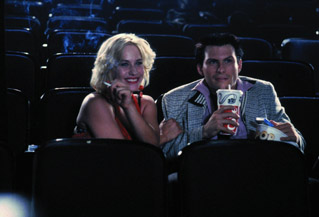Viking Night: True Romance
By Bruce Hall
April 23, 2013
BoxOfficeProphets.com

If you've ever wondered what would happen if the writer of Pulp Fiction and the director of Top Gun made a movie together, you were probably thinking of True Romance. In the classic Tarantino idiom, this is a ballet of bullets and bad decisions filled with thin, quirky characters prone to long, stylishly self conscious monologues. It kind of seems like a natural fit for Tony Scott’s brand of hyperkinetic impulse oriented storytelling, and for the most part things work out that way. As an added bonus it also stars Christian Slater, who was very popular at the time, and Patricia Arquette as a pair of misguided lovers who bite more out of life than they can chew.
And it's all in the name of love, money and drugs.
Clarence Worley (Slater) is an oily but affable comic store clerk by day and a cloying barfly/kung fu movie enthusiast by night. You might not be surprised to hear that he’s single. Alabama Whitman (Arquette) is a chain smoking call girl with (surprise) a heart of gold who gets hired by Clarence’s boss to show Clarence a good time on his birthday. The plan goes off without a hitch but before either knows what’s happening, the two crazy kids actually fall in love. For Alabama, it’s because she can’t resist his practiced, disaffected charm. In Clarence’s case, it’s because he’s a hermit-nerd who’s so happy to have a girlfriend he doesn’t care how it happened. They have the same likes, dislikes, turn-ons, habits and vices. They even like the same kind of pie.
So the next day they get married, and immediately move in together. Everything is fine until Alabama casually mentions Drexl (Gary Oldman), her old pimp. Just the thought of anyone coveting her but him makes Clarence's skin crawl. He starts losing his perspective and then inexplicably has a vision where Elvis Presley (Val Kilmer) orders him to kill. Swivel Hips warns him that despite finding the love of his life, he will never truly be happy until he brutally murders Drexl. Clarence makes it happen and by the time it's over, he's come into possession of a half million dollars worth of cocaine. He realizes that an enterprising man could sell those drugs and walk away with the kind of money a young couple might use to settle down.
When Clarence reveals all this to Alabama she is not frightened, nor is she repulsed. She doesn't even pause to consider the ramifications of marrying a homicidal maniac. This comes after a satisfyingly simple setup that was just enough to make you care, and possibly even believe, that two people might genuinely fall in love in under the time it takes to marinate a steak. These were two fundamentally decent people who could see past each other's (considerable) flaws and possibly build something together. But to reduce him to an impulsively violent mental patient and her to a masochistic brawler without sufficient motivation robs the film of direction. These are not just a couple of innocent kids trying to beat the odds - they’re dangerous psychopaths who care about nothing but their own gratification.
Had Clarence been forced into murder, forced to flee, this story becomes about two young lovers on the run from a situation they did not create. But since he talks to dead rock stars and takes to murder the way most people take to ranch dressing, he’s difficult to connect with. When Alabama - who we are told is the moral center of this relationship - fails to question any of it, the light inside her goes out as well. So when Drexl’s employer (Christopher Walken) and his mobile goon squad come looking for them, it’s a little hard to tell one sociopath from another. And when Clarence's estranged father (Dennis Hopper) and best friend (Michael Rapaport) get sucked into the violence, it’s impossible not to put the blame on Mr and Mrs Worley.
And that's pretty much what True Romance brings to the table. It’s basically a Tarantino film - fetishized female lead and all - polished a bit and then filmed by the man whose photograph Michael Bay kisses every night before he and his golden mane go to bed. Now, if you’re the kind of person who only consumes entertainment because you can’t stand being alone with your own thoughts, you’ll probably enjoy this movie - and that's totally okay. But the least I can ask of a film is that the story establishes a baseline level of logic and then stick to it. And for God's sake give me characters that behave in consistent ways, regardless of the kind of story you’re trying to tell.
I don’t need to like my heroes, I just need to know I can believe in what they’re doing. All we really had to do was let Drexl make the first move (and lose the Ghost of Elvis, whose gimmicky presence does not help), and then every stupid mistake Clarence and Alabama make for the rest of the film (and there are many) might be chalked up to fear instead of madness. A number of otherwise inexplicable compromises begin to look like survival choices, rather than just reckless self absorption. The plot also might have benefitted from Tarantino’s trademark nonlinear style - it's a great way to cover up bad storytelling because it’s almost impossible to follow what’s happening anyway. Tony Scott does his best, but he can't overcome such a critically flawed story or such desolate protagonists.
True Romance demands our allegiance even after it takes away everything that made us come close to caring in the first place. And we’re left to regard what’s left of it not through the prism of True Romance, but Pure Nihilism.